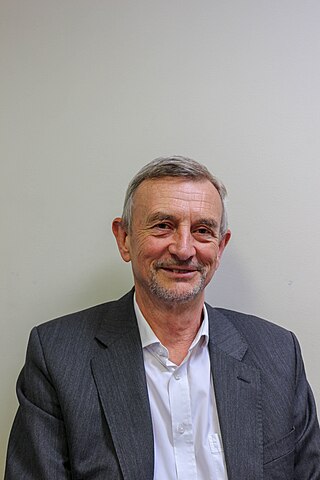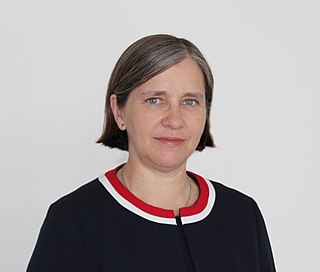
Hull York Medical School (HYMS) is a medical school in England which took its first intake of students in 2003. It was opened as a part of the British Government's attempts to train more doctors, along with Brighton and Sussex Medical School, Peninsula Medical School and University of East Anglia Medical School.
Alastair Buchan is a British neurologist and researcher in stroke medicine. His main research interest is how to make neuroprotection a reality in the clinic. From October 2008 until January 2017, he served as the Dean of Medicine and the Head of the Medical Sciences Division, University of Oxford. He currently holds the Chair of Stroke Research and is the Pro-Vice-Chancellor and Head of Brexit Strategy at the University of Oxford.
Professor Dame Janet Elizabeth Husband is Emeritus Professor of Radiology at the Institute of Cancer Research. She had a career in diagnostic radiology that spanned nearly 40 years, using scanning technology to diagnose, stage, and follow-up cancer. She continues to support medicine and research as a board member and advisor for various organisations.
Dame Margaret Elizabeth Turner-Warwick was a British medical doctor and thoracic specialist. She was the first woman president of the Royal College of Physicians (1989–1992) and, later, chairman of the Royal Devon and Exeter Health Care NHS Trust (1992–1995).

The Oxford Handbook of Clinical Medicine is a pocket textbook aimed at medical students and junior doctors, and covers all aspects of clinical medicine. It is published by Oxford University Press, and is available in print format and online. First published in 1985, it is now in its tenth edition, which was released in July 2017.
John Andrew Todd FMedSci FRS is Professor of Precision Medicine at the University of Oxford, director of the Wellcome Center for Human Genetics and the JDRF/Wellcome Trust Diabetes and Inflammation Laboratory, in addition to Jeffrey Cheah Fellow in Medicine at Brasenose College. He works in collaboration with David Clayton and Linda Wicker to examine the molecular basis of type 1 diabetes.
Professor Sir Munir Pirmohamed is a British clinical pharmacologist and geneticist. Since 2007 he has been the NHS Chair of Pharmacogenetics at the University of Liverpool.
Ramani Moonesinghe OBE MD(Res) FRCP FRCA FFICM SFFMLM is Professor of Perioperative Medicine at University College London (UCL) and a Consultant in Anaesthetics and Critical Care Medicine at UCL Hospitals. Moonesinghe was Director of the National Institute for Academic Anaesthesia (NIAA) Health Services Research Centre between 2016 and 2022, and between 2016 and 2019 was Associate National Clinical Director for Elective Care for NHS England. In 2020 on she took on the role of National Clinical Director for Critical and Perioperative care at NHS England and NHS Improvement.
Prof Thomas Paterson Noble FRCSE FRSE OWE was a Scottish surgeon who served Prajadhipok, the King of Siam
Sharon Jayne Peacock is a British microbiologist who is Professor of Public Health and Microbiology in the Department of Medicine at the University of Cambridge.

Dr Angela Eleine Thomas is a physician originally specialising in paediatric haematology who has held leading roles during her long career in health and medicine. She is a non-executive director for the Cell and Gene Therapy Catapult. She has had a leading role in the regulation of medicines at National, European and International level and until 2018 was vice chair of the UK government’s Commission on Human Medicines, chairing its Clinical Trials, Biologicals and Vaccines Expert Advisory Group.

The Edinburgh College of Medicine for Women was established by Elsie Inglis and her father John Inglis. Elsie Inglis went on to become a leader in the suffrage movement and found the Scottish Women's Hospital organisation in World War I, but when she jointly founded the college she was still a medical student. Her father, John Inglis, had been a senior civil servant in India, where he had championed the cause of education for women. On his return to Edinburgh he became a supporter of medical education for women and used his influence to help establish the college. The college was founded in 1889 at a time when women were not admitted to university medical schools in the UK.
Rosalind Raine is a British applied health research scientist, public medicine doctor, professor of health care evaluation and the founding head of the Department of Applied Health Research at University College London (UCL).

Sir Stephen Huw Powis is national medical director for England, in the National Health Service (NHS), appointed at the start of 2018 to succeed Sir Bruce Keogh. He is also a professor of renal medicine at University College London.
Professor Richard M. Leach FRCP is a British Consultant Physician and Professor at Guy's and St Thomas’ NHS Foundation Trust, who is accredited in general, respiratory and critical care medicine. He has pioneered multiple respiratory care techniques and been instrumental in the development of numerous NICE guidelines relating to acute medicine. It has been reported that he lead the care of British prime minister Boris Johnson during the 2020 COVID-19 pandemic.
Mike Grocott is professor of anaesthesia and critical care medicine at the University of Southampton and director of the National Institute for Health and Care Research's (NIHR) Southampton Biomedical Research Centre (2022-27). He is an NIHR Senior Investigator (2018-26) and was national specialty group lead for Anaesthesia Perioperative Medicine and Pain within the NIHR Clinical Research Network (2015-2021). He is a consultant in critical care medicine at University Hospital Southampton NHS Foundation Trust.
Russell Mardon Viner, FMedSci is an Australian-British paediatrician and policy researcher who is Chief Scientific Advisor at the Department for Education and Professor of Adolescent Health at the UCL Great Ormond Street Institute of Child Health. He is an expert on child and adolescent health in the UK and internationally. He was a member of the UK Government's Scientific Advisory Group for Emergencies (SAGE) during the COVID-19 pandemic and was President of the Royal College of Paediatrics and Child Health from 2018 to 2021. He remains clinically active, seeing young people with diabetes each week at UCL Hospitals. Viner is Vice-Chair of the NHS England Transformation Board for Children and Young People and Chair of the Stakeholder Council for the Board. He is a non-executive director (NED) at Great Ormond St. Hospital for Children NHS Foundation Trust, also sitting on the Trust's Finance & Investment and the Quality and Safety sub-committees.

Martin Neil Rossor, is a British clinical neurologist with a specialty interest in degenerative dementias and familial disease.
Philip Michael Bath is a British clinician scientist. He is Stroke Association Professor of Stroke Medicine at the Stroke Trials Unit within the University of Nottingham. He specialises clinically in stroke and academically has established large-scale trials in treating and preventing stroke. Bath worked as a junior doctor before specialising in general medicine, stroke and hypertension. He is an Honorary Consultant Physician at Nottingham University Hospitals NHS Trust. He has spent his academic career at St George's, University of London, King's College London and University of Nottingham.

Lucy Chappell is a British professor of obstetrics at King’s College London and the Chief Scientific Adviser (CSA) for the UK Department of Health and Social Care. As part of her CSA role, she oversees the National Institute for Health and Care Research (NIHR) as Chief Executive Officer. Her research areas include medical problems during pregnancy such as pre-eclampsia, and the safety of medicines in pregnancy.







